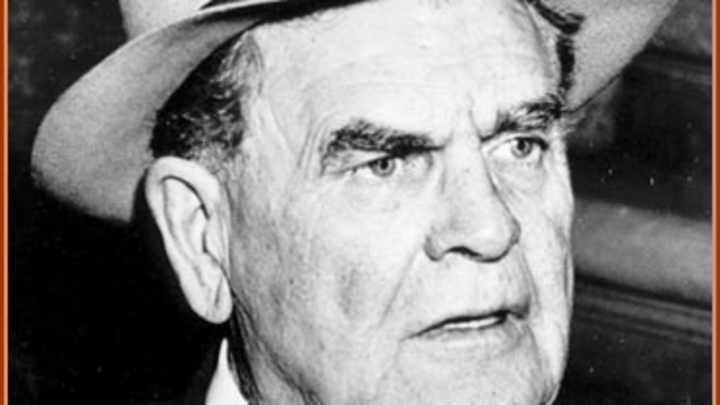Tale of the coaching tape: Nick Saban vs. Glenn “Pop” Warner

There are few, if any, names more synonymous with football than Glenn Scobey Warner, who was tabbed with the nickname “Pop” when he played for Cornell from 1892-94 for being older than most of his teammates.
Warner’s subsequent coaching career began at Georgia in 1895, when the entire student body was made up of 126 students. It included stops at Iowa State (1895-99, he coached teams from two schools simultaneously three times), Cornell (1897-98, 1904-06), the Carlisle Indian Industrial (1899-1903, 1907-14), Pittsburgh (1915-23), Stanford (1924-32), and Temple (1933–38).
Not including his 18-8 record at Iowa State, which was still a decade from joining its first conference, the Missouri Valley, Warner went 311-103-32 over 42 years, for an outstanding winning percentage of .723.
He had only three losing seasons, and had four teams receive national championship consideration. His 1916 Pitt team was not only his best team, but considered the overwhelming consensus national champion before the poll era began (the other three were 1915 and 1918 teams at Pitt, and Stanford in 1926).
While Warner didn’t lose a game with the Panthers until his fourth season, the 1915 team featured the unique war cry from center Bob Peck: “When Peck fights, the team fights!” The 1916 squad beat Navy, Syracuse, Penn and Penn State while notching four of its six shutouts.
As for the 1926 title with Stanford, it was led by All-American end Ted Shipkey and sophomore fullback Clifford “Biff Hoffman,” to finish 10-0-1. The tie came in the Rose Bowl against Alabama, despite out-gaining the Crimson Tide 305 yards to 98, thanks mostly to a blocked punt. Stanford topped the power rankings computed by Frank Dickinson, a University of Illinois economics professor, but the majority of services preferred Alabama.
Warner also coached what’s undoubtedly the best college football program most fans have never heard of, Carlisle, which was the first federally supported school of Native Americans to be established off a reservation. Over 25 years, before closing in 1918, it compiled a record of 167-88-13, thanks in part to eight future inductees into the College Football Hall of Fame.
At one time the entire Carlisle coaching staff consisted of Warner and an Oneida Indian named Wallace Denny, the trainer, who doubled as the school’s night watchman. The team often played as many as 10 games in six weeks. In 1912, Warner’s squad went 12-1-1 and scored 504 points. The following year it finished 11-2-1 with 295 points.
His most notable player there was none other than Jim Thorpe, considered by some to be the greatest all-around athlete in United States history. As a halfback in 1907-08, and again in 1911-12, he played 44 games with 53 touchdowns and 421 points. According to the College Football Hall of Fame, statistics for 29 of the games show he averaged 8.4 yards per carry. In 1912, he had 29 touchdowns and 224 points, which led the nation.
“Thorpe was the greatest athlete of his time, maybe of any time in any land,” legendary sportswriter Red Smith once wrote, and with good reason. At the 1912 Olympics in Stockholm he won the pentathlon and decathlon. Thorpe went on to play Major League Baseball (1913-19), pro football (1915-28), and was said to excel in every sport he attempted, including golf, tennis, lacrosse, field hockey, riding, rowing, gymnastics, archery, bowling, darts, billiards, basketball, swimming, boxing and wrestling.
Nick Saban vs. Glenn “Pop” Warner
(For consistency reasons, statistics through 2018 season)
Category, Saban; Warner
Seasons 23 44
Consensus national titles 6 1
Top five finishes 9 NA-i
Top 25 finishes 16 1-i
Overall record 232–62–1* 319-106-32
Percentage 78.5 73.3
Losing seasons 0 4
Bowl record/CFP record 14-10 1-2-1
Percentage 58.3 37.5
Conference titles 9 4
Conference record 138-42-1 36-13-5
Consensus All-Americans 41 23
First-round draft picks 34 NA-i
Record against ranked teams 82-40 1-3-1-i
Percentage 67.20 30.0
Record against Top 10 teams 42-21 0-0-1-i
Percentage 66.77 50.0
Ratios/percentages
National title seasons One every 3.8 seasons; 44
Consensus All-Americans 1.78 every season; .52
First-round draft picks 1.48 every season; NA
Average wins vs. ranked teams 3.57 each season; NA
Wins over top-10 teams per year 1.82 every season; NA
i-The first Associated Press poll and NFL Draft were conducted in 1936
Some of the information in this report was also used in the book "Nick Saban vs. College Football."

Christopher Walsh is the founder and publisher of Alabama Crimson Tide On SI, which first published as BamaCentral in 2018, and is also the publisher of the Boston College, Missouri and Vanderbilt sites . He's covered the Crimson Tide since 2004 and is the author of 27 books including “100 Things Crimson Tide Fans Should Know and Do Before They Die” and “Nick Saban vs. College Football.” He's an eight-time honoree of Football Writers Association of America awards and three-time winner of the Herby Kirby Memorial Award, the Alabama Sports Writers Association’s highest writing honor for story of the year. In 2022, he was named one of the 50 Legends of the ASWA. Previous beats include the Green Bay Packers, Arizona Cardinals and Tampa Bay Buccaneers, along with Major League Baseball’s Arizona Diamondbacks. Originally from Minnesota and a graduate of the University of New Hampshire, he currently resides in Tuscaloosa.
Follow BamaCentral